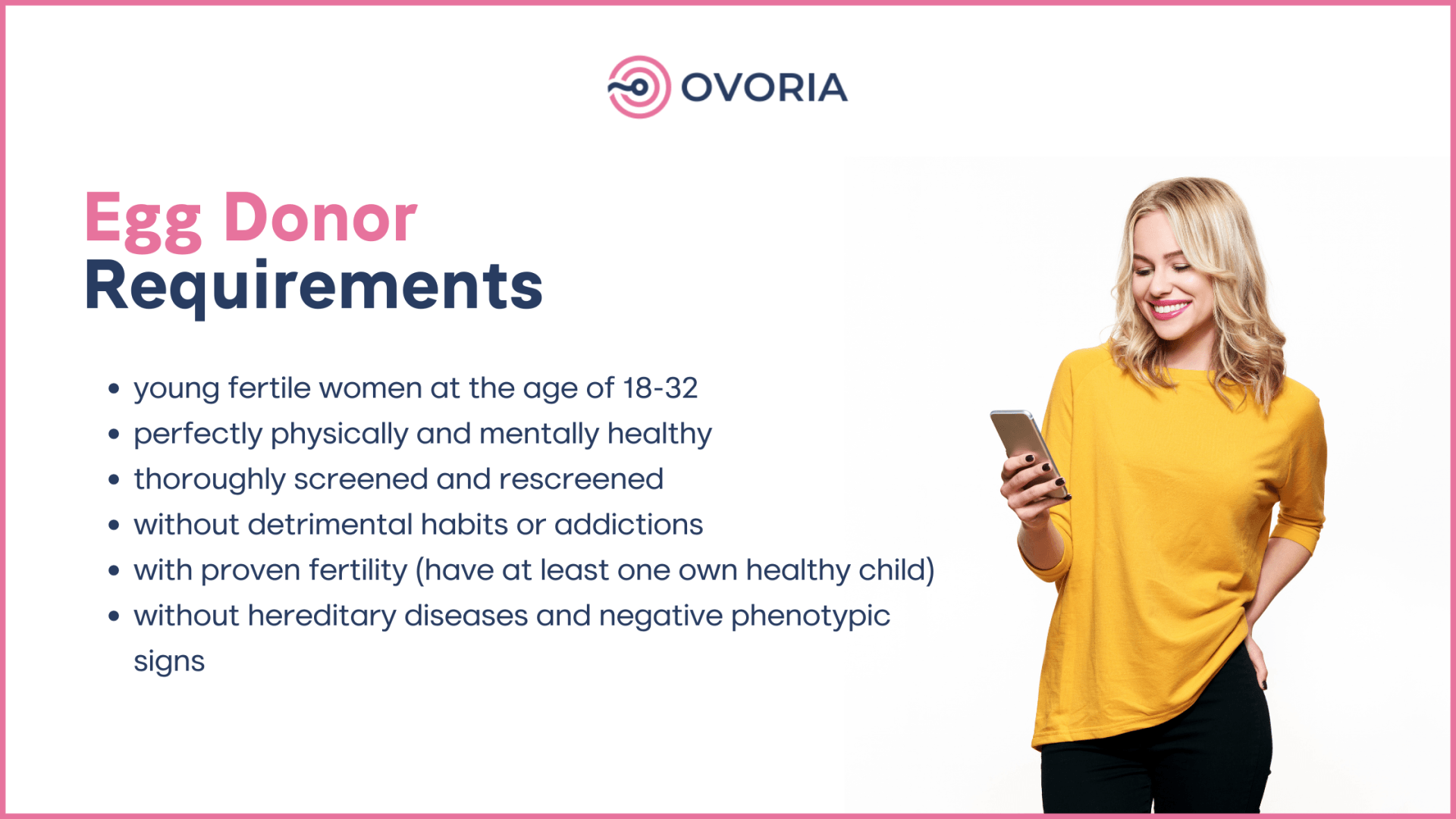Egg Donor | Things You Should Know About Donating Your Eggs
Egg donation is a vital process in fertility treatments, offering individuals and couples the chance to conceive when natural conception is not an option. If you are considering becoming an egg donor in the UK, it is essential to understand the process, requirements, and regulations that guide egg donation. This article provides an overview of everything you need to know, using reputable sources and up-to-date information.

Egg Donation and Role of the Egg Donor
Egg donors play a crucial role in fertility treatments, helping recipients who are unable to conceive with their own eggs. The process typically involves donating eggs to be fertilised with donor sperm or the recipient’s partner’s sperm through in vitro fertilisation (IVF). The resulting embryos are then transferred to the recipient’s womb.
Becoming an egg donor is a generous act that helps create families. Egg donors are not genetically responsible for children conceived through their donation. Instead, their contribution is seen as a gift with no legal parental rights or responsibilities.
Egg Donor Requirements
To become an egg donor in the UK, certain criteria must be met. These requirements ensure the health and safety of both the donor and the potential child born from the donation. The Human Fertilisation and Embryology Authority (HFEA), the UK regulatory body for fertility treatment, outlines the following standards:
- Age: Donors should be aged 18–35, though exceptions may apply for specific circumstances.
- Health: Potential donors undergo medical screening to rule out genetic, hereditary, or infectious conditions.
- Lifestyle: Donors must not engage in activities that pose risks to their health or the health of the eggs, such as smoking or substance abuse.
- Commitment: Donors must be willing to attend all medical appointments and follow the egg donation process diligently.
At Ovoria, we employ additional requirements to ensure optimal donor eggs. In addition to those previously mentioned, we employ the following criteria:
- A stricter age requirement: We only accept women between 18 and 32 years of age.
- Exceptional mental health: Donors must, in addition to meeting physical requirements, have an excellent mental health.
- Proven fertility: Donors must have a history of at least one successful pregnancy.

Egg Donors UK - Regulatory Framework, Number of Children Conceived, and More
Egg donation practices and regulations vary significantly around the world, reflecting cultural, ethical, and legal differences. In this section, we focus on egg donation in the UK, highlighting the regulatory framework that governs the process, the number of children conceived through egg donation, and other key considerations. Topics such as donor rights, compensation, and anonymity are also addressed, providing a comprehensive overview of how egg donation is managed in the UK.
Regulations
In the UK, egg donation is regulated by the HFEA to ensure ethical practices and safeguard the rights of donors, recipients, and donor-conceived children. Key regulations include:
- Ten-Family Limit: Eggs from a single donor can be used to help create children for up to ten families.
- Donor-Conceived Children’s Rights: At the age of 18, children conceived using donated eggs can request non-identifying information about their donor. They can also access identifying information, such as the donor’s name and last known address, if provided.
- Compensation: Egg donors can receive up to £985 per cycle to cover expenses, but it is illegal to pay donors for their eggs in the UK.
- Anonymity: Donors provide a goodwill message and non-identifying details for recipients and donor-conceived children but cannot remain completely anonymous.
Egg donation in the UK adheres to strict legal and ethical standards, ensuring donors are fully informed and consent to the process.
Donor Conceived Children in the UK
According to HFEA (2024), approximately 4,100 children were born with the help of donors in 2019. This means that one out of every 170 births are made possible through the generosity of donors. Out of these 4,100 children, 1,300 are conceived through egg donation, while 2,800 are born by the help of a sperm donor.
Other Considerations in the UK
Counselling Requirements
In the UK, counselling is mandatory for all egg donors to ensure they fully understand the emotional, physical, and legal implications of their decision. This process helps donors reflect on the potential impact of their donation, including future contact with donor-conceived children. Counselling also provides emotional support, preparing donors for any challenges they may encounter.
Limits on the Use of Donated Material
Eggs donated in the UK are strictly regulated to ensure ethical use. Donated eggs are primarily used to create embryos for the recipient’s fertility treatment, either immediately or through freezing for future use. The HFEA prohibits commercialisation or distribution of donated eggs beyond their intended purpose, safeguarding donor and recipient rights.
Donor Identification Information Storage
The HFEA maintains a comprehensive database that stores both identifying and non-identifying information about donors and recipients. This ensures donor-conceived children can access accurate records when they turn 18, including details about their donor’s name, date of birth, and last known address. This system fosters transparency and prioritises the rights of donor-conceived individuals.
Egg Donor Process - Each Step Potential Donors Must Go Through
The egg donation process involves several key stages to ensure the health and safety of everyone involved. Here is an outline of the steps:
- Initial Screening: Potential donors contact a licensed UK fertility clinic or an egg bank in the UK. The donor team conducts initial interviews and reviews the donor’s medical history.
- Counselling: Counselling is mandatory to ensure donors fully understand the process, legal implications, and potential emotional impact.
- Medical Assessments: Screening includes blood tests, genetic testing, and a pelvic ultrasound to evaluate the donor’s ovarian reserve.
- Preparation: The donation cycle begins with hormonal injections to stimulate the ovaries. This process ensures multiple eggs are collected during a single cycle.
- Egg Collection: Eggs are retrieved through a minor surgical procedure under sedation. This step typically takes about 30 minutes, and donors can resume normal activities within a few days.
- Post-Donation Care: Follow-up appointments ensure the donor’s health and recovery. Eggs collected are then fertilised to create embryos for the recipient’s fertility treatment.
Potential Risk Factors for Egg Donors
Although egg donation is generally very safe, women who are considering becoming a donor should be aware of potential risks.
- Mild Reactions to Fertility Drugs: Side effects like headaches, nausea, bloating, or mood swings are relatively common but usually mild. These affect a small percentage of donors (ASRM, 2022) and are easily managed. Always inform the clinic if symptoms occur.
- Ovarian Hyperstimulation Syndrome (OHSS): This rare condition occurs in less than 1% of cases and is typically mild when it does happen. Severe OHSS, which can include abdominal swelling, pain, nausea, and shortness of breath, is extremely rare, with a prevalence of 0.1–0.2% in well-monitored cycles (HFEA, n.d.; ASRM, 2022). Clinics monitor donors closely to reduce the risk.
- Infection from Egg Retrieval: The risk of infection after egg retrieval is very low due to the use of sterile techniques. Fewer than 1 in 1,000 cases might experience an infection, which is treated with antibiotics (Practice Committee of the ASRM, 2022)
- Bleeding or Injury During Egg Retrieval: Complications such as internal bleeding or injury to surrounding organs occur in fewer than 0.1% of cases. Clinics use ultrasound guidance to minimise risks during the procedure (ASRM, 2022; NHS, n.d.)
- Emotional and Psychological Impact: Emotional challenges, such as concerns about the future of donor-conceived children or anxiety about the process, vary among individuals. Professional counselling is provided to help manage these emotions (HFEA, n.d.; Fertility Network UK, n.d.)
- Anaesthesia Risks: Reactions to sedation or anaesthesia are rare, occurring in less than 1 in 10,000 cases. Most are mild and temporary, such as dizziness or nausea after the procedure (NHS, n.d.).
- Long-Term Fertility Concerns: Current research indicates no evidence that egg donation negatively affects future fertility when performed by experienced professionals. Ovarian reserve is unaffected in the vast majority of cases (ASRM, 2022; Fertility Network UK, n.d.)
- Risk of Multiple Donation Cycles: While rare, donors undergoing multiple cycles could face cumulative hormonal exposure, increasing the risk of mild side effects or complications slightly. However, guidelines recommend limiting cycles to ensure safety (ASRM, 2022; HFEA, n.d.)
Become an Egg Donor - Donate Your Eggs
Choosing to donate your eggs is a decision that can change lives. This selfless, altruistic act will enrich the life of individuals who are struggling to conceive naturally. Considering that recent years have shown a trend of increased infertility, the impact of the decision to become an egg donor is greater than ever. If you are considering to give the gift of life, we are happy to aid you in the journey of donating your eggs. Don't hesitate to reach out - we are here for you!
Frequently Asked Questions
How do you become an egg donor?
To become an egg donor, you must meet specific requirements, including being 18–35 years old and in good health. You’ll undergo a medical screening, counselling, and a thorough evaluation by a licensed fertility clinic. Once approved, you’ll start the donation process, which involves taking hormonal medications and undergoing an egg retrieval procedure.
Can you donate eggs to a family member or friend?
Yes, it is possible to donate eggs to a family member, friend, or someone you know. Yet, there are certain restrictions in place, as mixing eggs and sperm of close family members (brothers, sisters) is not complying with the law.
How many donor egg babies born each year globally?
While precise global statistics are limited, it's estimated that hundreds of thousands of babies are born each year worldwide through egg donation. For instance, in 2017, Europe reported 28,377 donor egg cycles, and the U.S. had nearly 20,000 IVF transfers using donor eggs in 2019. Given these figures, the global number of births resulting from donor eggs is substantial, though exact numbers are not readily available.
References
Human Fertilisation and Embryology Authority. (n.d.). Egg donation: What is egg donation? Retrieved January 11, 2025, from https://www.hfea.gov.uk
British Fertility Society. (n.d.). Becoming an egg donor. Retrieved January 11, 2025, from https://www.britishfertilitysociety.org.uk
National Health Service (NHS). (n.d.). Egg donation. Retrieved January 11, 2025, from https://www.nhs.uk
Fertility Network UK. (n.d.). Egg donation FAQs. Retrieved January 11, 2025, from https://fertilitynetworkuk.org
American Society for Reproductive Medicine. (2022). Guidelines for gamete and embryo donation. Retrieved January 11, 2025, from https://www.asrm.org
Human Fertilisation and Embryology Authority. (n.d.). Egg donation: Risks and safety. Retrieved January 11, 2025, from https://www.hfea.gov.uk
National Health Service. (n.d.). What happens during egg donation? Retrieved January 11, 2025, from https://www.nhs.uk
Practice Committee of the American Society for Reproductive Medicine. (2022). Complications associated with ovarian stimulation. Fertility and Sterility, 118(3), e1-e14.
Fertility Network UK. (n.d.). FAQs about egg donation. Retrieved January 11, 2025, from https://fertilitynetworkuk.org

